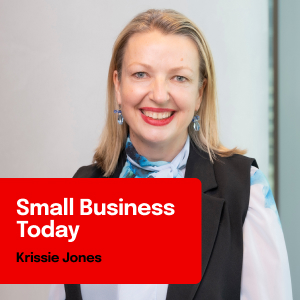Protecting your business online is simpler than you think. NAB Executive Business Direct and Small Business, Krissie Jones, shares practical advice on how you can get started.


Newsletter
Agromin Australia is expanding its exports by sticking to what it knows best – pulses for the Indian subcontinent. Owner Rajni Patel explains how the company is cornering a larger and larger share of the market for Australian farmers.
In Malaysia, Patel’s family exported palm oil and fresh produce to Bangladesh, India and Pakistan.
“When I came here, I just switched to exporting Australian pulses. Agromin’s first market was India and our first crop Australian chickpeas,” he says. “Dun and field peas and three types of lentils followed.”
New to Australia, Patel decided not to deal directly with farmers but to work with established packing houses around the country. “It made sense. They already had strong relationships with farmers so I just needed to negotiate a contract with them.”
Approximately five years ago, Agromin bought a 50 per cent stake in Peaco, a Victorian packing house connected to about 150 farmers. Agromin can buy from Peaco, which will then pack and prepare the orders for export at the facility.
“I bought into Peaco because of my relationship with Shane McGregor, the General Manager. We’ve known each other for 20 years so, when he wanted to expand operations, I thought, ‘let’s make this a win-win situation’,” Patel says.
“Peaco sells to whoever pays the highest price,” he adds. “Agromin doesn’t get any favours. It’s a very transparent relationship.”
These days, Patel talks to packers over the phone. “In the beginning, I used to go around, but now everybody knows us, so we just chat on the phone. And once a year, we all meet at the Australian Pulse Conference in Melbourne.”
Agromin’s global reputation is built on supplying quality product and reliable delivery. “My policy is to only buy good quality,” Patel explains. “It’s the basis for my good name all over the world.”
He adds that because prices can change one day to the next, it’s important the importer knows the agreed contract price will be honoured, whatever the market does.
“I always make sure the shipments are done right and that I do the right thing regarding price.”
Peaco briefs the farmers about what the Indian subcontinent market will be wanting in around six months’ time, which all depends on what crops are failing in India, Bangladesh and Pakistan.
“If there’s no rain or there’s extreme flooding, especially in June, July and August, the market and price will definitely move,” Patel explains.
However, he says demand is always there – and growing as extreme weather patterns increase.
“In 2016, India and Pakistan’s crops failed, so the prices are now high. It set a record for us of about 2 million tonnes.”
While food fads don’t apply to such traditional markets, Agromin knows the region’s shifting festival timetables and understands which foods are eaten at certain times.
“We’re very good at timing shipments to meet those peaks in demand,” Patel says. Examples include the Diwali festival in October and Ramadan in late May to June. “We make sure we meet delivery a few weeks before, so importers can rely on us and say, ‘buy from Agromin and you always get the product in time’.”
Patel explains that only price used to matter in his markets. ‘Clean and green’ didn’t concern importers or the end consumer until recently. “Now people are becoming health conscious and asking that the containers are clean. Additionally, new restrictions on weed seeds into India meant stricter importation standards.” Suddenly, there had to be a lot of cleaning of pulses – but Peaco was prepared.
“At Peaco we store all the products in separate silos. That’s around 40,000 tonnes of storage, over 25 to 30 silos to accommodate and separate dun peas, fava beans, three varieties of lentils, two types of chickpea and many others.”
Agromin packs, tests and ships FOB (free on board) so they and the packing house arrange for the containers and nominate the vessel. “We order our containers steam-cleaned so there are no wheat traces, and our pulses are externally tested for moisture, protein and purity for quarantine purposes.”

Although the pulses are packed on demand and at the packer’s facilities, Patel isn’t tempted to invest in the transport side of the business or in new markets. His attitude is simple: if there’s no margin, there’s no deal.
“We can’t compete in the Middle East because of Russia, the Ukraine and South American countries. And most of Australia’s sorghum goes into China, where I don’t understand the price or have good buyers,” he explains.
Instead, he spends his energy negotiating contracts and organising reliable delivery for what he knows best – proof that sticking to what you know can be a very successful export strategy.
© National Australia Bank Limited. ABN 12 004 044 937 AFSL and Australian Credit Licence 230686.